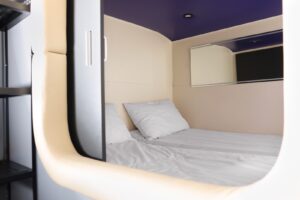Nearly one-third of adults and 73% of high school students in the United States fall short on sleep. A lack of adequate sleep, in terms of either quantity or quality, increases a person’s risk of car crashes, work accidents, and a variety of health problems. For this reason, getting adequate sleep is of utmost importance.
Napping is considered an integral part of sleep for young children, but the practice may provide benefits to adults, too. Research studies have found that napping can:
- Reduce tiredness
- Increase mental ability
- Improve memory
- Improve physical performance
- Reduce muscle soreness
- Boost mood
- Improve nighttime sleep
- Improve heart health
- Improve health of older adults
Although research has demonstrated that naps can give a boost to both sleep-deprived people and those who obtain enough sleep, study findings are inconsistent. In fact, researchers have identified a nap paradox, in which many studies find naps provide benefits, while others find napping is associated with illnesses.
Studies show napping might be particularly helpful for people who cannot sleep during regular nighttime hours, such as those who work rotating schedules or at night. A nap taken before working overnight or during a night shift can reduce sleepiness and improve work performance. Naps may also reduce the risk of car crashes due to drowsy driving.
Top 5 Tips for the Best Nap

- 1 Avoid napping after 3 p.m.
- 2 Limit your nap to 30 minutes or less.
- 3 Try to block out daylight and noise as much as you can.
- 4 If you nap regularly, try to nap at the same time each day.
- 5 Try having caffeine right before a nap so that the effects kick in when you wake up.
Naps scheduled at the right time of day and for the right amount of time can help energize you for the rest of the day.
How Long Should I Nap?
The ideal nap length depends on an individual’s unique situation, as well as what they want from the nap. Most experts recommend that healthy people who are not sleep-deprived take short naps, defined as ranging from five to 20 minutes. Due to the nature of the human sleep cycle, naps longer than 30 minutes might induce a phenomenon called sleep inertia, in which you feel confused and groggy for a brief period upon waking and your performance suffers.
Research shows that a shorter nap, ranging from five to 15 minutes, can perk you up immediately and provide increased cognitive benefits lasting from one to three hours. You might wake up experiencing sleep inertia after a nap lasting longer than 30 minutes, but improved cognition will eventually kick in, and it could outlast the benefits of a shorter nap.
How Long Is a Power Nap?
A power nap is a brief nap intended to increase performance after waking. The optimal length of a power nap is still up for debate, though short naps are often defined as falling under 30 minutes. Researchers have studied even briefer naps, finding benefits from 20-minute, seven to 10-minute, and even six-minute naps.
The ideal nap length for you depends on how much time you have to sleep, how soon you need to feel increased alertness after your nap, and how long you want that energy boost to last. A shorter nap is ideal when you need to immediately wake up and get back to work, while a longer nap might be a better idea if you are experiencing or about to experience sleep deprivation.
What Is the Best Time to Nap?
The best time to nap depends on your sleep-wake schedule. Those who sleep during the night often experience a dip in energy and performance in the early afternoon, called the post-lunch dip or afternoon slump. Timing a nap for the early afternoon may help to counteract this post-lunch dip in energy.
Napping too close to bedtime may cause difficulty sleeping at night, so try to schedule your nap at least several hours before you plan to go to bed.
For people who experience sleep deprivation due to an unusual sleep schedule, a different nap time could be ideal. For example, shift workers may benefit from taking a nap prior to a night shift, or from scheduling naps during a night shift.
See the Best Mattresses of 2024Tips for Your Best Nap
In preparation for your nap, set your alarm for your desired nap length and find a comfortable environment to bed down. Since quiet and darkness can help you sleep, try to block out noise and light. Consider using a sleep mask to cover your eyes and earplugs or a white noise machine to shut out sound.
Relaxation techniques have also been demonstrated to improve naps. Online recordings and sleep apps can guide you through progressive muscle relaxation or hypnosis.
Not everyone finds naps helpful, and some people may find it difficult to fall asleep in the middle of the day. However, if you lie down to take a midday nap, but do not fall asleep, you might still obtain benefits from quietly resting. Researchers have found that what they call napitation, a brief nap or meditation, can slow brain waves and result in similar levels of rejuvenation after getting back up.
References
Ask the Sleep Doctor
Have questions about sleep? Submit them here! We use your questions to help us decide topics for articles, videos, and newsletters. We try to answer as many questions as possible. You can also send us an email. Please note, we cannot provide specific medical advice, and always recommend you contact your doctor for any medical matters.


